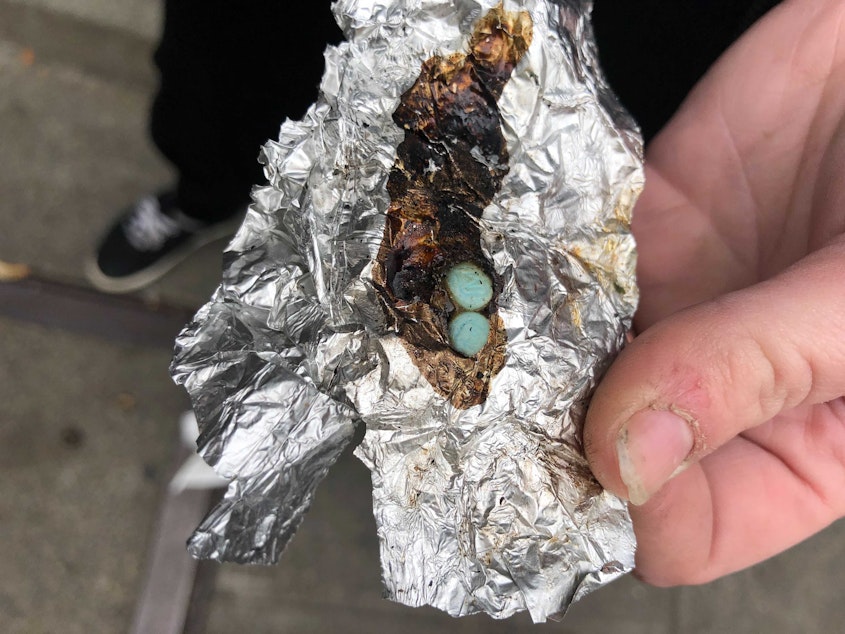Seattle City Council passes controversial drug ordinance

The Seattle City Council voted 6-3 Tuesday to make drug use and possession a gross misdemeanor under city law, ending a period of uncertainty about who is responsible for enforcing those minor crimes.
The vote allows the city attorney to prosecute drug cases, but also encourages a “public health approach” to addiction, which would emphasize pre-trial and pre-arrest diversion and treatment programs.
The bill doesn't contain any new funding for drug treatment.
RELATED: Seattle program addresses gap in opioid crisis — post-overdose support
Mayor Bruce Harrell said he will “not waste any time in signing” the law and will also be issuing an executive order which, among other things, will clarify how he wants Seattle Police to enforce the new law.
Councilmembers Lisa Herbold, Debora Juarez, Andrew Lewis, Sara Nelson, Alex Pedersen, and Dan Strauss Voted in favor of the new drug law. Voting against it were Councilmembers Tammy Morales, Teresa Mosqueda, and Kshama Sawant. The bill's passing was greeted by a mix of applause and boos in the council chambers.
Earlier this year, the council considered a similar law that failed by one vote. Councilmember Andrew Lewis was viewed as the swing vote in that failed attempt. He had been leaning “yes,” but changed his mind and voted against the bill after heated public comment in which some community members raised concerns that the law would resurrect the failed “war on drugs,” which disproportionately harmed people of color.
The new ordinance includes suggestions to the Seattle Police Department (SPD), encouraging officers to consider whether a drug user “presents a threat of harm to others” before making arrests, for example.
RELATED: UW researcher says there's a simple way to help people addicted to fentanyl
Sponsored
Lewis said the new measure, which he co-sponsored, does not seek to “resolve our public health crisis in our courts,” but instead emphasizes "handoffs to service providers" and diversion.
"I will be the first person to acknowledge this is not going to be a panacea to solve every single problem that is associated with the fentanyl epidemic," Lewis said.
The goal of the new policy is to “guide and limit officer discretion,” and to “identify people we don’t think should be eligible for arrest, and steer those people to pre-arrest diversion,” co-sponsor Lisa Herbold said during the Tuesday council meeting.
"New war on drugs"
The council also debated a proposed amendment by Councilmember Teresa Mosqueda to strengthen that provision. Her amendment would have required — instead of suggested — that police assess the threat of harm to others before making arrests. But that amendment failed to pass in a tight 5-4 vote.
“This bill does not address the root causes of addiction,” Mosqueda said in voting against the final legislation. “This law will exacerbate the racial disparities that we’re already seeing in who gets arrested.”
RELATED: There's meth on that — Study finds drug traces on Seattle transit rides
Sponsored
During a rowdy public comment period, some community members also questioned the legislation, calling it “the new war on drugs.”
“We all know this is bad policy it puts more power in the hands of police, like the police union leaders we have just heard showing blatant disregard for a death of a member of our community,” Alice Lockhart said.
Other members of the public said they supported the council’s efforts.
“We are encouraged that this is tool the city can use to help facilitate diversion and recovery in our community,” said Dennis Sales, who works at Plymouth Housing, a permanent supportive housing provider.
The vote comes after a period of uncertainty about drug laws in Washington, starting with the state Supreme Court’s 2021 Blake decision, which found the state’s felony drug possession law unconstitutional. After first passing a temporary fix in 2021, the state Legislature this year passed a new law to make drug use and possession a gross misdemeanor, punishable by up to 180 days in jail or a fine of $1,000, with penalties increasing after two offenses.
Sponsored
The new Seattle ordinance brings city law more in line with that state law.
Timeline by KUOW Creative Manager Teo Popescu.


